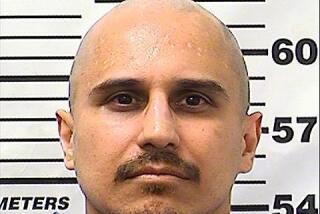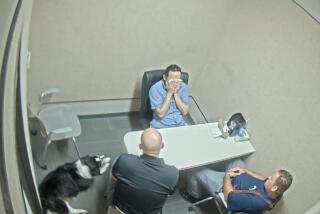Jury Decides Slaying Was Self-Defense : Courts: Gay-rights activists contend that Anthony E. Diaz was convicted of a lesser charge because the victim was a homosexual.
In a taped confession shortly after his arrest, Anthony E. Diaz admitted beating and strangling a 62-year-old Port Hueneme man so he could steal his videocassette recorder.
But the jury apparently believed the story that Diaz and his lawyer told at his trial last month: that he killed “predatory homosexual” Bruce Pope in self-defense.
In what one prosecutor called “a jury pardon,” the jury decided that Diaz was guilty of involuntary manslaughter, not first-degree murder, second-degree murder or voluntary manslaughter.
The stiffest sentence that Ventura County Superior Court Judge Lawrence Storch could impose by law was four years and eight months in prison for what the judge on Tuesday called “one of the most egregious involuntary manslaughters I have ever seen.”
“I can’t analyze how the jury got there,” said Storch, who noted that Diaz had “confessed to felony murder” in a tape played to the jury. Pope was beaten 20 to 30 times with various objects and strangled with a phone cord.
“We live with what the jury does,” Storch said.
About 10 gay-rights activists attended the sentencing in protest, saying Diaz had gotten off easy because his victim was a homosexual.
“If he had strangled a heterosexual woman, the jury would have looked at it in a completely different light,” said Claire Connelly, executive director of Gay and Lesbian Resources of Ventura County.
Deputy Dist. Atty. James D. Ellison agreed that Diaz’s attorney, Richard W. Hanawalt, had succeeded in putting the victim on trial and focusing attention on Pope’s practice of bringing home strangers for sex.
“It’s the only way I can explain it,” Ellison said.
Diaz, 27, told a probation officer that before the verdict he had expected to spend the rest of his life in prison for killing Pope. Instead, under parole regulations he could be free before the end of next year, taking into account the time he already has served and the time off he can expect for good behavior.
Diaz said nothing during his sentencing. As he was led back to jail, he winked at a family member in the back row of spectators.
In his statement to police, played for the jury, Diaz gave this account of what happened July 3:
After being denied admission to a drug-treatment facility for lack of insurance, Diaz said he stole his girlfriend’s stereo and sold it for $250 worth of cocaine. He said he injected the drug while sitting in his car at the beach in Port Hueneme. Out of gas, Diaz said he started off on foot and encountered Pope, who was walking his dog.
Pope then invited Diaz to his nearby condominium for drinks. While Pope was upstairs, Diaz said he disconnected Pope’s videocassette recorder but could not leave with it because the front door was bolted shut. Diaz said he went upstairs and struck Pope in an attempt to knock him unconscious so he could escape with the videocassette recorder.
Diaz said Pope struck back with a lamp. Diaz got hold of the lamp and struck Pope with it, according to the statement. Eventually, Diaz said, he wrapped the cord around Pope’s neck four times and strangled him.
At his trial, however, Diaz changed that account substantially. He testified that the violence erupted after Pope had hid his pants while Diaz was taking a shower. Diaz said he hit Pope when the victim refused to return the pants so Diaz could leave.
Both of Diaz’s accounts had the same ending: After killing Pope, he sold the victim’s videocassette recorder, television and computer and bought more drugs. He fled to Arkansas but surrendered about three months later.
One jury member who attended the sentencing said the nature of the strangling was what troubled jurors most.
“For all of us, the major issue was the phone cord four times around his neck,” the juror, who asked not to be identified, said. “Did he intend to kill?”
After 2 1/2 days of deliberations, the panel agreed that Diaz was acting in self-defense and settled on the involuntary-manslaughter verdict, which amounted to a finding that Diaz acted without malice or premeditation.
“Tony was trying to leave the room and this man wanted to intimidate him, to force him into a homosexual act,” the juror said. She said the victim’s sexual orientation did not influence the jury.
“He was a citizen. He has the same rights as anyone else whatever his sexual preferences,” the juror said. She said critics of the jury did not hear all the evidence.
Even with the favorable verdict, defense attorney Hanawalt made an emotional plea Tuesday for mercy at the sentencing. He called Pope a “predatory homosexual” who routinely cruised around looking for down-and-out strangers to lure back to his condominium for sex.
“I have never, ever, ever seen anyone who drives around at night looking for young lads whom he takes home and photographs in their misery,” Hanawalt said. “William Faulkner could not have dreamed up a character like Mr. Pope.”
Given Pope’s “predatory nature,” Hanawalt said, “he was an accident waiting to happen. The question was who.
“It happened to be this lad here,” he said, motioning toward the defendant.
Hanawalt asked Storch to order that Diaz receive drug treatment while in prison. The judge said he will leave that to prison authorities.
In an interview with a probation officer May 1, Diaz said he has nightmares about the killing. He said he turned himself in because he was “having a hard time dealing with it.”
He also said he was surprised by the jury’s verdict, according to the report.
“I didn’t expect to walk away this easy,” he said.
More to Read
Sign up for Essential California
The most important California stories and recommendations in your inbox every morning.
You may occasionally receive promotional content from the Los Angeles Times.










